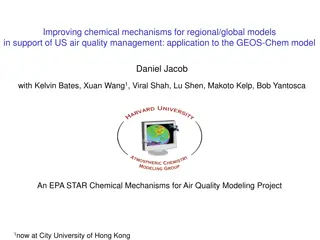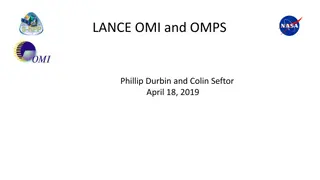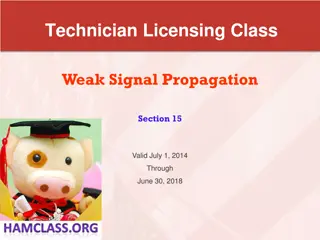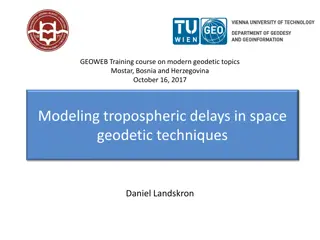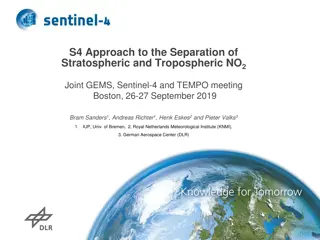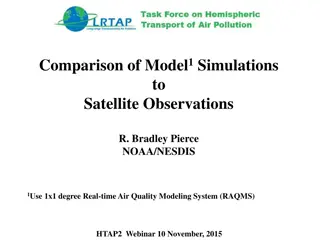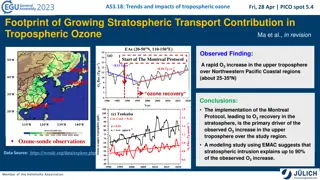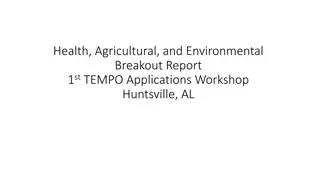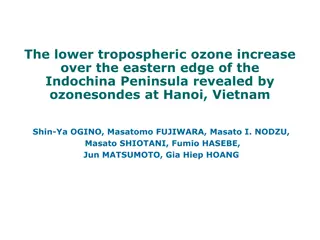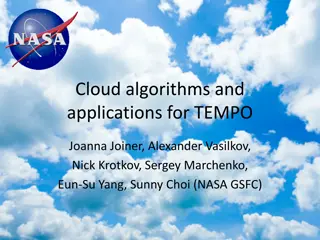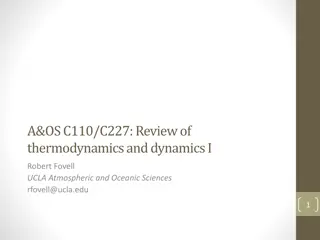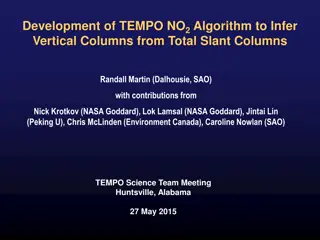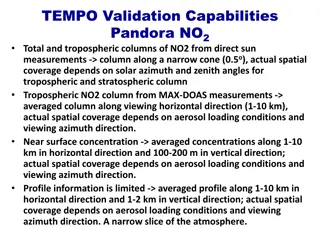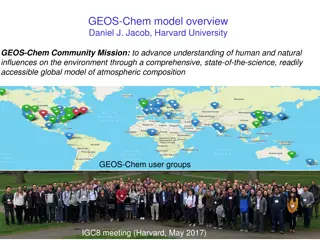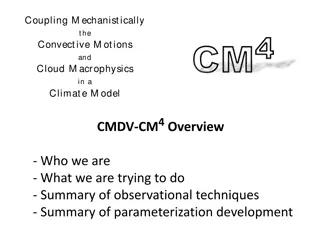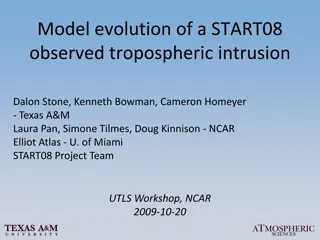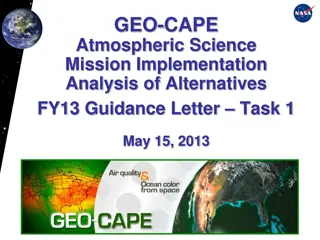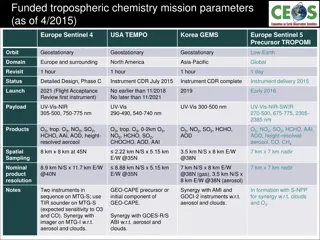Kala ilam specialist in UK Or Bangali Amil baba in USA 923217066670 NO2-Kala i
For all problem solutions just contact with Amil baba Fareed Bangali 923217066670 #vashikaranspecialist #astrologer #palmistry #amliyaat #taweez #manpasandshadi #horoscope #spiritual #lovelife #lovespell #marriagespell#aamilbabainpakistan #amilbabainkarachi #powerfullblackmagicspell #kalajadumantar
0 views • 1 slides
Advancements in Chemical Mechanisms for Air Quality Management
Daniel Jacob and team have been enhancing chemical mechanisms in the GEOS-Chem model to support US air quality management. Ongoing work includes developing new mechanisms for aromatic VOCs, tropospheric halogens, mercury redox, adaptive mechanism reduction, machine learning applications, and unifica
0 views • 19 slides
Updates on OMI and OMPS Data Products
Status and future developments of OMI and OMPS data products include the preparation of new algorithms, upcoming releases, incorporation into LANCE, validation processes, and delivery timelines. Updates range from OMI Total Ozone algorithm version (OMTO3) to OMPS-NPP LANCE Data Products and OMPS SNP
4 views • 9 slides
Understanding Weak Signal Propagation in Radio Waves
This informative content delves into weak signal propagation and its various aspects related to electromagnetic waves, particularly in the context of radio communication. It covers topics such as radio waves, radio horizon, knife-edge diffraction, tropospheric scatter mode, auroral reflection, and m
1 views • 37 slides
Understanding Tropospheric Delays in Geodetic Techniques
Explore the fundamentals of troposphere delays in geodetic measurements, including refractivity, modeling techniques, and impact on positioning accuracy. Discover the complexities of radio signal delays and bending effects due to atmospheric interactions. Gain insights into the Vienna troposphere mo
0 views • 80 slides
Stratospheric and Tropospheric NO2 Separation Approaches
This document discusses the separation of stratospheric and tropospheric NO2 using different approaches such as spectral retrieval, conversion of slant columns, and two distinct methods for handling the data. Challenges for geostationary sensors and baseline approaches for operational algorithms are
0 views • 23 slides
Insights into UV/VIS Backscattered Sun Light Retrievals from Space-Born Platforms
Explore the history, instruments, and future of UV/VIS backscatter spectrometers, including a comparison of TOMS and OMI systems, the GEO constellation, and examples of data retrievals. Dive into the discovery of the ozone hole and the advancements in atmospheric chemistry analysis by USA, Europe, a
0 views • 41 slides
Comparison of Model 1 Simulations to Satellite Observations for July 1, 2010
Explore the comparison of Model 1 simulations with various satellite measurements such as AIRS, OMI, CloudSat, and CALIPSO for July 1, 2010. Focus on OMI Tropospheric NO2 data and factors impacting the tropospheric NO2 column retrieval.
0 views • 27 slides
Impacts of Tropospheric Ozone and Stratospheric Transport Contribution
The study examines the trends and impacts of tropospheric ozone, focusing on the significant increase observed over the Northwestern Pacific Coastal regions. It explores the primary drivers behind this ozone increase, attributing up to 90% to stratospheric intrusions as a result of the Montreal Prot
0 views • 6 slides
Report on Health, Agricultural, and Environmental Breakout at 1st TEMPO Applications Workshop
This report highlights the potential applications of TEMPO data for addressing gas phase pollutants like NO2, SO2, and O3 impacting human health and agriculture. It discusses the need for improved spatial coverage and data latency, as well as potential collaborations with key partners like CDC, USDA
0 views • 7 slides
18 (2Certified Black magic worldwide Black magic specialist in Oman NO2-kala ila
For all problem solutions just contact with Amil baba Fareed Bangali 923217066670 #vashikaranspecialist #astrologer #palmistry #amliyaat #taweez #manpasandshadi #horoscope #spiritual #lovelife #lovespell #marriagespell#aamilbabainpakistan #amilbabai
0 views • 1 slides
Study on Lower Tropospheric Ozone Increase in Indochina Peninsula
Research conducted in Hanoi, Vietnam, reveals an increase in lower tropospheric ozone over the eastern edge of the Indochina Peninsula. The study focuses on understanding the three-dimensional distribution and temporal variation of ozone to comprehend air pollution and atmospheric variability. Findi
0 views • 11 slides
Cloud Algorithms and Applications for TEMPO by Joanna Joiner et al.
Explore the cloud algorithms and applications for TEMPO, including the default baseline algorithm, OMI rotational-Raman algorithm, and other options like O2-O2. Learn about the validation with CloudSat, O2-O2 intercomparisons, and the implementation of tall poles for CLDRR applied to TEMPO. Discover
0 views • 9 slides
Microbial Transformations of Nitrogen in Soil: Factors, Forms, and Impact on Plant Nutrition
Understanding the microbial transformations of nitrogen in soil is crucial for optimizing plant nutrition. Factors such as climate, water supply, cultivation, soil texture, and depth influence the nitrogen content in soil. The different forms of soil nitrogen, including inorganic and organic compoun
0 views • 23 slides
Understanding Atmospheric Composition and Structure
The presentation covers fundamental concepts related to the Earth's atmosphere, including its composition, origin of oxygen, dry and moist layers, standard atmosphere layers, and temperature variations. Key topics discussed include the primordial atmosphere, atmospheric constituents, water vapor dis
0 views • 58 slides
Developments in Vertical Columns Inference for TEMPO NO2 Algorithm
The development of the TEMPO NO2 algorithm to infer vertical columns from total slant columns involves contributions from various experts, such as Randall Martin, Nick Krotkov, Lok Lamsal, Jintai Lin, Chris McLinden, and Caroline Nowlan. Attention is needed for the removal of stratospheric NO2 and a
2 views • 10 slides
Pandora Advanced Validation Capabilities for NO2 Monitoring
Pandora advanced validation capabilities for NO2 monitoring involve measurement techniques such as Total and Tropospheric columns of NO2 through direct sun and MAX-DOAS methods, with emphasis on spatial coverage dependent on various factors. The system provides real-time near-surface concentrations,
0 views • 6 slides
GEOS-Chem Atmospheric Chemistry Model Overview
GEOS-Chem, developed by Daniel J. Jacob at Harvard University, is a global model of atmospheric composition used to understand human and natural influences on the environment. The model addresses various atmospheric chemistry issues on different scales, from local to global, and is regularly updated
0 views • 19 slides
Master Set of High School Chemistry Naming Rules
A collection of chemical compounds with their names and classifications as ionic or molecular. Includes explanations and ratios for naming compounds such as Co(OH)3, Mn(NO2)3, SiO2, Mn(MnO4)4, SF2, and ZrO2. Helpful for high school chemistry students to practice and understand naming rules.
0 views • 49 slides
Understanding Coupling of Convective Motions and Cloud Macrophysics in Climate Model CMDV-CM4
This project led by Lawrence Berkeley National Laboratory aims to mechanistically couple convective motions and cloud macrophysics in the CMDV-CM4 climate model. Through observational techniques and parameterization development, they seek to evaluate and enhance current cloud representations, develo
0 views • 16 slides
Analysis of Tropospheric Intrusion Evolution in START08 Field Campaign
The study presents the analysis of tropospheric intrusion evolution during the START08 Field Campaign using models such as WACCM and GFS. The primary goals include comparing model output with observations, verifying dynamical transport features, and studying the spatial and temporal evolution of mid
0 views • 26 slides
Analysis of GEO-CAPE Atmospheric Science Mission Alternatives
The Geostationary Coastal and Air Pollution Events (GEO-CAPE) mission aims to measure atmospheric composition and ocean color. The impact of the Tropospheric Emissions Monitoring of Pollution (TEMPO) instrument on GEO-CAPE planning is acknowledged, with a need to adjust GEO-CAPE activities. An analy
0 views • 20 slides
Funded Tropospheric Chemistry Mission Parameters Overview
Funded tropospheric chemistry missions like Europe Sentinel 4, USA TEMPO, Korea GEMS, and others aim to monitor atmospheric composition for air quality assessment. The missions involve advanced instruments to measure ozone, nitrogen dioxide, sulfur dioxide, aerosols, and more, with specific spatial
0 views • 9 slides

